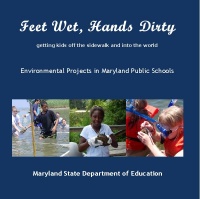 BALTIMORE (Feb. 3, 2008) - Maryland has always been a progressive state when it comes to environmental issues. Our public schools also share in the enthusiasm for
the welfare of our natural environment. The Maryland State Department of Education's (MSDE) has released a new book, Feet Wet, Hands Dirty: Environmental Projects in Maryland Public Schools, which showcases environmental projects developed by students throughout the state. The new book details 15 different elementary school projects, including raising wetland plants to provide habitat for the state butterfly; raising and releasing terrapins; creating ceramic murals depicting different Chesapeake Bay habitats; developing and implementing energy conservation plans in their schools, and planting trees on school grounds and in the community.
BALTIMORE (Feb. 3, 2008) - Maryland has always been a progressive state when it comes to environmental issues. Our public schools also share in the enthusiasm for
the welfare of our natural environment. The Maryland State Department of Education's (MSDE) has released a new book, Feet Wet, Hands Dirty: Environmental Projects in Maryland Public Schools, which showcases environmental projects developed by students throughout the state. The new book details 15 different elementary school projects, including raising wetland plants to provide habitat for the state butterfly; raising and releasing terrapins; creating ceramic murals depicting different Chesapeake Bay habitats; developing and implementing energy conservation plans in their schools, and planting trees on school grounds and in the community.
The book can be purchased online at http://www.blurb.com/bookstore/detail/111841. It sells for $12.95 for the softcopy and $22.95 for the hardcopy.
Maryland's Environmental Education program allows students to investigate environmental issues and problems and take action to preserve or restore the environment. Maryland students have tremendous opportunities during the school year to study the many facets of the state's environment like forests, farms, mines, cities and towns, rivers and streams, wetlands, bogs, beaches, and especially the Chesapeake Bay.
"We are grateful to our students for their eagerness to get their feet wet and their hands dirty through such projects as planting streamside buffers, monitoring water quality in rivers and streams across the state, and developing energy conservation plans in their schools," said Dr. Nancy Grasmick, State Superintendent of Schools. "I am proud of the work our teachers and community partners are doing to educate an entire generation and motivate students to take action to preserve and restore our natural environment."
The Maryland State Department of Education has been charged with implementing the Stewardship Provision of the Chesapeake Bay 2000 Agreement, which requires that all students engage in a meaningful watershed experience as a part of the regular curriculum before they graduate from a Maryland high school. More than 300,000 students per year participate in such projects. In addition, Maryland schools continue to strive for the Maryland Green School award designation.
The sponsor of the program, the Maryland Association for Environmental and Outdoor Education (MAEOE) last year recognized 27 new Maryland Green Schools and recertified 15 schools, marking the largest number of Maryland Green Schools named in a single year since the programs inception in 1999. There are now 163 Maryland schools with Green School status.
"Hands-on learning is an essential part of instilling a stewardship ethic in our youth. The National Oceanic and Atmospheric Administration's (NOAA) Bay Watershed Education and Training Program, or B-WET, is proud to be a part of Maryland's effort to ensure that all students benefit from this type of experience," said Shannon Sprague, Environmental Literacy Coordinator for the NOAA Chesapeake Bay Office.
Another important partner in Maryland's environmental and conservation programs is the Chesapeake Bay Trust which provides funding to support many of the programs throughout the schools.
Maryland's goal is to make every Maryland school a Green School while providing a meaningful outdoor experience for all students every year. For more information or to order Feet Wet, Hands Dirty visit the Environmental Programs section on the MSDE website at www.marylandpublicschools.org/MSDE/programs/environment/.


